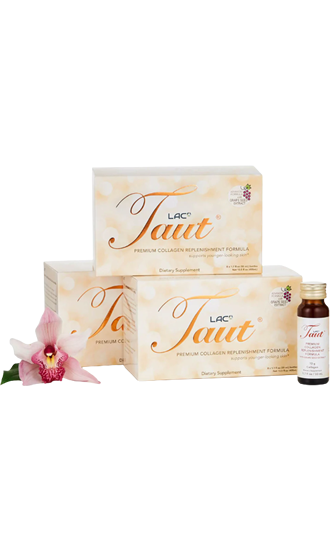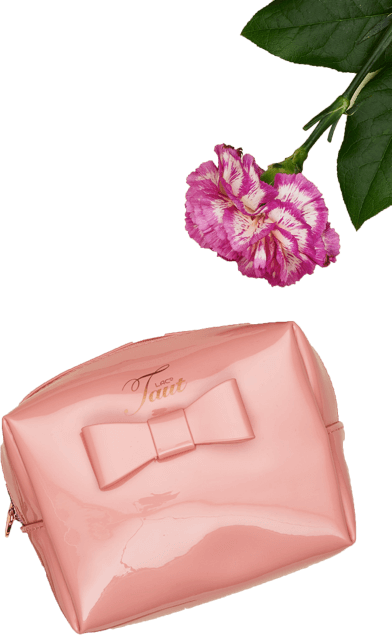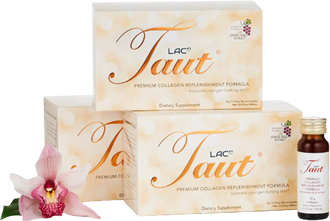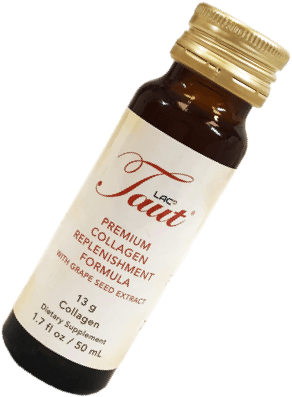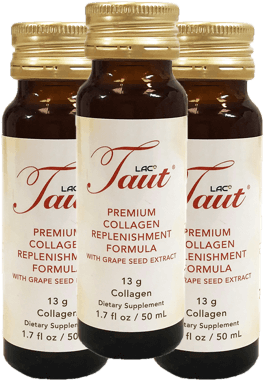Retinol Benefits: What Are the Pros of Serum, Cream, & Oil for the Skin?
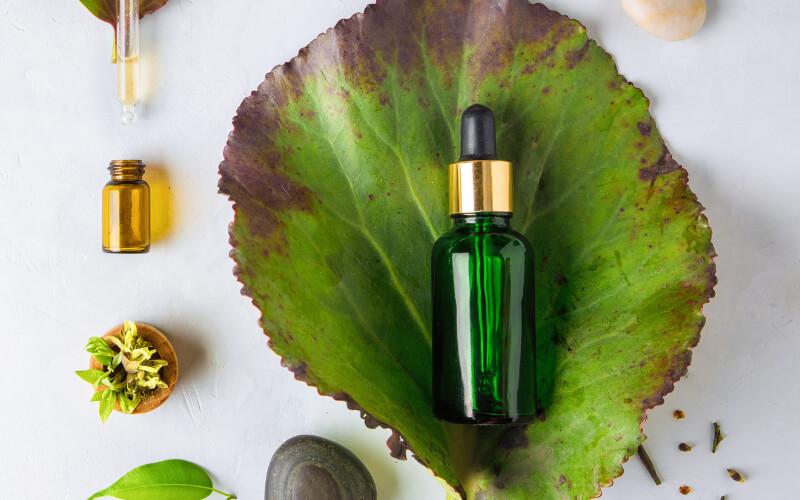
Over the last seven years, as a beauty writer and researcher, I’ve learned a lot about serious skin care products and ingredients. And although there’s been a considerable amount of research on the best ones, there’s still just a handful everyone agrees are the most worthwhile.
Dermatologists, aestheticians, and skin care experts all have their personal favorites, ranging from botanical extracts to at-home LED devices.
The thing is, 99% of them (even some natural skin care gurus) agree that if youthful skin is your goal, then you’ve got to try retinol.
I have to say, I jumped on the retinol bandwagon and I haven’t looked back ever since.
Whether you are considering taking advantage of retinol benefits for acne, anti-aging, minimizing wrinkles, or fading-away pigmentation, here’s everything you need to know about this gold-standard skincare ingredient.
More helpful reading: best ingredient for anti aging
What Is Retinol?
Let’s first start by getting science-y. Retinol, in short, is a type of vitamin A—a nutrient that helps boost cell turnover (among many other things). It’s a type of retinoid, which is an umbrella term for the family of chemical compounds that are all related to vitamin A, and include retinoic acid, retinyl palmitate, and retinaldehyde.
When it comes to retinols in anti-aging skin care, New York City board-certified dermatologist Whitney Bowe, MD explains that retinol is often added to topical products to brighten the skin, reduce the appearance of acne, encourage the turnover of our skin cells, and give a kick-start to collagen production. On top of that, she goes on to explain that people use retinol products because they can act as an antioxidant. Retinol works to improve the appearance of signs of aging—sun damage on face, age spots, and wrinkles—caused by excess free radicals. 1
Now more than ever, women are integrating retinol products into their skincare routine. And why is that? Because of the countless benefits of retinol for skin! Retinol works in anti-aging and anti-acne skincare products to:
- Unclog pores
- Reduce the appearance of signs of aging
- Increase skin thickness (combat thin skin)
- Stimulate elastin and collagen production
- Help remove dark spots and sun damage
- Get rid of stretch marks and improve skin texture
Retinol skin care benefits people with acne issues, pigmentation problems, and aging concerns (like fine lines and wrinkles). Almost anyone turn to retinol to help lessen these common skin worries. No wonder retinol is the gold standard of anti-aging skin care ingredients!
More helpful reading:
https://www.renewskinco.com/blogs/i/vitamin-a-for-skin
How Does Retinol Work With the Skin?
Retinol works by activating enzymes in the dermis. These enzymes eventually convert retinol into retinoic acid, which is the active form of vitamin A.
New York board-certified dermatologist Dendy Engelman, MD explains retinol benefits for skin come from retinoic acid. Retinoic acid can communicate with the receptors of skin cells and tell them to function like “healthy, younger” skin cells. 2
More helpful reading:
https://www.renewskinco.com/blogs/i/over-50-skin-care-routine
Retinol vs. Retinoid
The difference between retinol and retinoids is that over-the-counter products contain a form of retinol in ester forms (vitamin A derivatives). The most common names found are retinyl palmitate, retinyl acetate, retinyl linoleate, etc.
According to Dr. Engelman, derivatives that are closer to the retinoic acid form will work better and show better results. Most often, these derivatives are available by prescription only. 3
That's why so many people turn to dermatologists and plastic surgeons to get prescription retinoids (under the brand names Retin-A and Tretinoin). These prescription-only products contain higher concentrations of retinoic acid compared to options that are available over the counter, which typically have between 0.5–2 percent concentrations.
Although retinoic acid comes with an impressive catalog of benefits, there’s a catch: it’s extremely powerful, and applying it directly onto the skin without using a moisturizer notoriously causes irritation, such as redness, dryness, and peeling (think of it this way—your skin’s renewal “system” is on turbo-boost mode). Retinol, on the other hand, is a milder alternative that provides fewer of these side effects.
More helpful reading: How to get rid of wrinkles on forehead
What Are the Benefits of Retinol? (Vitamin A / Retinol Cream Benefits)
From helping treat acne to lending a hand in smoothing away fine lines and wrinkles, retinol cream benefits people of all ages who are dealing with some of the most common skin problems.
Whether you’re an adolescent in the throes of acne or have reached your mid-30's and discovered that wrinkles are becoming more difficult to keep at bay, or you are suffering the double gut-punch of wrinkles and acne, retinol can seem like just the answer.
More Helpful Reading: Lines under eyes
Retinol for Face Benefits
Here are the 4 retinol benefits in skin care and why it's deemed to be the 'gold standard' anti-aging ingredient.
1. Reduces Acne
By increasing cell turnover, retinol helps unclog pores and prevent them from getting clogged in the first place. This not only helps reduce existing skin blemishes but also aids in preventing new breakouts.
Some types of vitamin A, like tretinoin (a.k.a. Retin-A), also help combat acne by blocking certain inflammatory pathways. By doing so, acne formation, particularly inflamed lesions, is less likely to occur. One of the benefits of retinol moisturizer is its ability to take care of just about any form of acne, including cysts, pimples, blackheads, and whiteheads. Learn how to get blackheads out here.
Retinol is an important element in skincare for oily skin that clears up the appearance of acne and prevents future breakouts.
More helpful reading:
https://www.renewskinco.com/blogs/taut-collagen/can-collagen-supplements-help-with-acne
2. Smoothes Fine Lines and Wrinkles
Anti-aging retinol face cream benefits include smoothing away fine lines and wrinkles and slowing down signs of aging. Thanks to its ability to boost collagen production, retinol can go to great lengths to help reduce the appearance of wrinkles and give you youthful skin. As collagen production is stimulated, wrinkles are also reduced in length and depth. Moreover, a study found that glycosaminoglycans, a substance that increases skin hydration, were also noted to increase through the use of retinol. 4
This is significant in that proper and adequate hydration also helps to keep skin wrinkle-free. That study further found that skin treated with retinol is better able to withstand injury, keeping it looking better in the long run. Dermatologist Sejal Shah, MD, agrees that retinol use is one of the most effective anti-wrinkle ingredients available. 5
More helpful reading:
https://www.renewskinco.com/blogs/i/what-causes-wrinkles
3. Boost Collagen Production (Anti-Aging)
Collagen is a protein that keeps skin smooth, taut, and firm. We lose it gradually as we age, which is essentially what causes fine lines and deep wrinkles to form and make us look older.
Loss of collagen can also contribute to sagging skin that doesn’t bounce back like it once used to. Retinol stimulates collagen production, helping to keep skin firm and smooth, or without lines. It can also help combat sagging.
More helpful reading: How is collagen made in the body?
To give your retinol skincare product an additional boost, include more collagen in your diet. Our Taut Collagen Peptide Powder contains 1,500mg of marine collagen peptides, hyaluronic acid, and grapeseed extract in one convenient sachet. Quickly dissolve one sachet into a glass of water or directly onto your tongue to build, support, and protect your skin’s natural collagen and elastin so you can flaunt a smoother, healthier complexion.
More helpful reading: Skin plumping by RenewSkin Inc.
4. Fades Discoloration, Removes Dark Spots, & Improves Sun Damage
As a retinol moisturizer or serum causes skin cell turnover, it causes the darker-colored skin to peel off, revealing normal-colored skin cells that appear in its place. Board-certified plastic surgeon James Romano, MD, explains, that retinols can make your skin lighter and improve the appearance of sun damage by causing the “dispersion and depletion of melanin” in the dermis. He continues to explain that retinol serum benefits the skin by thickening and strengthening dermal tissue. 6
In a 40-week, double-blind study, tretinoin was found highly effective in treating post-inflammatory hyperpigmentation, which can also occur as a result of acne, although 50% also developed retinoid dermatitis. This serves as a reminder that, unfortunately, retinol comes with some serious after-effects.
If you want to fade dark spots and discoloration but skip the downsides of retinols, try an antioxidant-packed supplement like Taut Bright. These skin lightening pills are made of a proprietary formula that perfectly combines 7 powerful antioxidants and active ingredients that have been proven by science to give you lighter, brighter, and more luminous skin.
More helpful reading from RenewSkin Inc.: How to get rid of age spots on face.
Types of Retinoids
There are several types of retinoids that have varying degrees of efficacy. Not all retinol is created equal.
There are both over-the-counter and prescription retinols. And, there are several types of retinol ingredients that you can easily spot on the back of various skincare moisturizers, creams, and serums. All of these types are derivatives of vitamin A, but may not necessarily work in the same ways.
Here’s the lowdown on the different types of retinoids and their strengths and applications (oral or topical), so you can get a sense of what’s best for you and watch out for the side effects that come with it.
- Retin-A - This is a prescription-only vitamin A derivative. In the treatment of acne, it works by unclogging pores and keeping them clear. This anti-aging treatment also helps reduce wrinkles and dark spots by boosting collagen production and increasing the turnover of skin cells, respectively. Due to their strength, this retinol is mostly prescribed by doctors for treating severe acne and other skin concerns. It’s very powerful and thus, when compared to other retinols and retinoids, can have very severe side effects, including dryness, redness, flakiness, and peeling that can be hard to deal with. (I’m not saying it’s impossible to benefit from it—a lot of people do—but there’s definitely a “learning curve” for your skin.) Learn more about inflamed skin.
- Isotretinoin - Retinol for acne includes this oral version which is used mainly for the treatment of severe acne. Brand names include Myorisan, Amnesteem, Claravis, Absorica, and Zenatane, though it was formerly known as Accutane or Roaccutane. It is available by prescription only and can cause severe side effects as well, including serious birth defects in unborn children. Women who are pregnant or breastfeeding should not use retinol. Learn more about skin care products safe during pregnancy.
- Retin-A Micro - This is only available as a gel, while regular Retin-A is available in cream, gel, and liquid forms. It works in much the same way as Retin-A. However, it’s less irritating and allows the medication to be released more slowly, thereby remaining effective for a longer period of time.
- Retinyl Palmitate - This vitamin A derivative is composed of retinol and palmitic acid (found in palm oil). It is an effective antioxidant that you may also find in the ingredients lists of various sunscreens.
- Retinol - This is a milder form of tretinoin. It gives similar results but often with fewer negative side effects. Dermatologists often recommend that their patients use retinol to treat acne and wrinkles because it increases the turnover of skin cells and decreases oil production. This is the type of pure retinol you’ll find in most over-the-counter products.
- Retinaldehyde - This derivative is also a milder form of retinol that promises to cause less of the undesired side effects. If you have sensitive skin, you might want to try retinaldehyde first before turning to retinol.
- Adapalene - This is a topical retinoid specifically used to address mild to moderate acne. It’s available in gel, liquid, and moisturizer forms, and works by nipping a pimple in the bud, essentially going to work within the dermis to prevent a breakout from forming.
- Tazarotene - This is a topical retinoid used to help various skin issues. It can help with acne, hyper-pigmentation, and psoriasis (by reducing the size and quantity of lesions). It can also be used as a wrinkle reducer. It’s available by prescription only in foam, cream, and gel forms.
More helpful reading: Ingredients to avoid in skincare.
The Different Forms of Retinol (Board-Certified Dermatologist Approved)
Now that we've covered all the chemical names and jargon—which can be so confusing—here are the 3 most common forms of retinol:
- Retinol Cream - Retinol creams are available from a variety of brands, by prescription or not. With non-prescription strength creams, it may take a few weeks longer to see results, but you will also not experience after-effects as extreme as if you were using prescription-strength products. You only need to use about a pea-sized amount of retinol product all over your face, as a little goes quite a long way. You should start to see results within three to six months, considering you’re using it every week. Retinol night cream benefits those with dry or sensitive skin because they contain moisturizing ingredients like petrolatum to help minimize the after-effects of retinol. They will also help to provide some hydration overall.
- Retinol Serum - Most serums are water-based, making them ideal for oily and acne-prone skin types. This formulation also tends to have higher concentrations of the active ingredient, making it more effective in general. These higher concentrations allow for the active ingredients to penetrate faster and deeper. However, after-effects may become a nuisance.
- Ingestible/Oral Retinol - Retinol use for acne is often available in pill forms, such as isotretinoin or Accutane. As previously discussed, this medication can cause extreme birth defects and should not be used by women who are or may become pregnant. However, it has also been shown to be highly effective in treating severe cystic acne, one of the most painful and hard-to-treat types of acne, that hasn’t responded to other types of topical and oral treatments.
Check out our guide to the best skin care by RenewSkin Inc.
The Cons of Using a Retinoid
Though not precisely too good to be true (dermatologists agree that retinol is a superhero ingredient), retinol is not without its drawbacks. Before starting retinol, you need to know that some of the negative effects can be quite unbearable.
For one thing, your skin may get worse before it gets better. This is often called the ‘purge’. During the purge, acne, peeling, and redness may get worse. Learn more about skin purging here.
If you’re a first-time retinol user or reintroducing retinols into your routine at night, this can be a challenging process to deal with. Most common skin reactions include:
- Redness, or undesirable flaring redness, sometimes even pain
- Skin peeling and flaking
- Irritation and dryness
Considering that retinol products can vary greatly when it comes to their strength, it can be hard to predict how your dermis will react. You could experience anywhere from minor to unbearable after effects.
But it's not just the fact that over-the-counter and prescription-strength retinoids are different—even some over-the-counter creams contain varying amounts of the active ingredient, making it almost impossible to tell which particular moisturizer you need to use. This can make the process of parsing through all the different options out there very hit-or-miss.
Additionally, it can be difficult to figure out the amount of retinol that you will need, but the best way to start to use retinol is by trial and error. Normally, just a pea-sized amount will suffice.
More helpful reading: best way to tighten skin above knees
Side Effects of Retinol
1. The Process Gets Worse Before It Gets Better
There is definitely some serious adjusting involved when starting a retinol regimen. And it can be tough. You will experience some after-effects right away, and your skin might even look pretty horrible at first.
That’s because retinol treatment almost always begins badly before the benefits kick in. So, yes, you will have to deal with the after-effects first before you can reap the rewards. There are alternatives to retinol if you can’t deal with the after-effects, which we will discuss later on.
More helpful Reading: Can you use hyaluronic acid with retinol?
2. Increased Risk of Sunburn and Skin Damage (Wear Sunscreen!)
One of the downsides of a retinol cream, moisturizer, or serum is that it can make your skin more photosensitive. This makes it inadvisable to use during the daytime or during warmer seasons, particularly in summer.
Dermatologists recommend wearing strong sunscreen during the daytime to prevent sun sensitivity. The best sunscreen to use if you’re undergoing a retinol treatment is an SPF-50 sunscreen with UVA and UVB protection (also known as ‘full-spectrum’).
If you plan on spending an extended amount of time in the sun, remember to reapply your sunscreen every two hours. If you are using retinols on your extremities, remember to apply sunscreen to those areas as well.
Besides making your dermis more sensitive to the sun’s rays, retinol also loses potency when exposed to sunlight. If you’re looking to make the most of your treatment and get all of the retinol skin benefits, you should only apply it at night.
More helpful reading: Marionette line treatment
3. Thinning Skin
By increasing your skin cell turnover, retinol essentially removes several layers of the epidermis, which can be seen when you start peeling and flaking. Thinner skin is more prone to injury and much more likely to be affected by harsh products—retinol is certainly such a product.
You might experience even more irritation and more sensitive skin as you continue using retinol and your dermis becomes thinner and thinner. Despite all the vitamin A/retinol cream benefits, this is the most significant drawback as thin skin can also tear and bruise more easily.
With thinner skin, you also have less skin elasticity and more dry skin. Overall, this is definitely one of the more severe cons of retinol.
More helpful reading: Skincare trends
4. Irritation
Retinoids can be highly irritating, even if your dermis is not particularly sensitive. Almost everyone who uses a retinol product, like a cream, moisturizer, or serum, will experience irritation like redness, peeling, and extremely dry skin that can range from tolerable to very uncomfortable. These will be worse if you’re not applying a moisturizer during your night-time skin care routine. Learn more about the best face products for redness here.
Irritation from retinol can also last for a week or more. According to Dr. Howard Murad, retinol oil benefits the skin by exfoliating it. However, during this process, the skin can become sensitive. He recommends using a small amount a few times per week to work up your skin’s tolerance. Moreover, many users find that this after-effect of extreme irritation is simply intolerable, and thus they quit using retinol before it starts to work its magic. Discontinuing use prematurely won't let you achieve the various benefits of retinol. 7
More helpful reading:
https://www.renewskinco.com/blogs/i/dry-skin-treatment
The Best Way to Ease Into Retinol (or Get the Same Results Without It)
If your skin eventually acclimates to retinol, that’s great! But if your skin is simply not having it, don’t feel alone or too disappointed. You can still relish in smooth, clear, and bright skin even if you have to use retinol with a lower percentage of active ingredients, limit use to just a couple of days a week or skip it altogether.
You can do this by supplementing with sufficient concentrations of collagen liquid. You see, the main reason why retinol is so highly prized is its ability to enhance the look of collagen- and elastin-deprived skin. This is because collagen and elastin are proteins that naturally keep skin firm and tight, reducing wrinkle formation and the sag that comes with aging. So, by addressing the collagen issue, you can reap similar benefits.
As you know, one of the after-effects of using Retinol is thinning or thinner skin. By ingesting a high-quality collagen supplement, you can minimize this side effect. Collagen peptides have been shown to increase the skin’s collagen density and thickness. However, not all collagen supplements are created equal. Learn more about collagen pills and supplements here.
More helpful reading: https://www.renewskinco.com/blogs/i/collagen-and-elastin
Best Alternative To Retinol in Your Routine for Wrinkle Reduction (Without the After Effects)
Collagen is the new buzzword and ingesting collagen, whether in powder form, pills or drinks, even bone broth, is on the rise. The reason for the sudden peak and awareness is probably due to the new understanding that our skin is made up of 70% collagen and losing it as we age is one of the root causes for skin aging.
Taut Collagen Intense Transformation can provide retinol-worthy results without the pesky after-effects. This product (which I call 'liquid gold') is loaded with marine collagen peptides, elastin, hyaluronic acid, and grape seed extract—some of the most powerful ingredients to get you back to that youthful glow.
Unfortunately, we start losing collagen and elastin around the time we turn 30, and it tends to go downhill from there. You will notice more fine lines and wrinkles, more sagging as collagen and elastin are slowly but surely depleted every year.
Meanwhile, hyaluronic acid is a powerful hydrating ingredient also naturally present in our skin that keeps it plump and helps fill in fine lines and wrinkles to make them less noticeable. Hyaluronic acid also decreases with age, and so it is essential to find a way to replenish both hyaluronic acid and collagen in our skin.
Our drink is also formulated with grape seed extract, which can help protect the skin from free radical damage and help minimize the appearance of sun damage, like brown spots and hyper-pigmentation.
With Taut in your regular night-time skincare routine, you can experience thicker, more resilient skin that is less likely to become damaged, less wrinkling and sagging. You’ll also notice a boost in radiance and overall tone, less visible scars, discoloration, and stretch marks, and even stronger hair and nails.
Including just one bottle of Taut in your routine every night of the week can make a big difference in the quality of your skin. And, in as little as 21 days, you’ll notice firmer, more glowing skin and enhanced youthfulness that is hard to put a price on.
Even though retinols are powerful and highly recommended by skincare professionals, the negative effects can be a strong deterrent. Whether or not it works for you (and honestly, I hope it does!), with Taut's program, you can enjoy firm, supple, beautiful skin without succumbing to irritation, increased sun sensitivity, thinner skin, and the drama of dealing with all the plethora of creams and serums out there.
Now, I have Taut Collagen as a backup no matter how little retinol I’m putting on my skin and I’m glowing!
More helpful reading: Collagen for face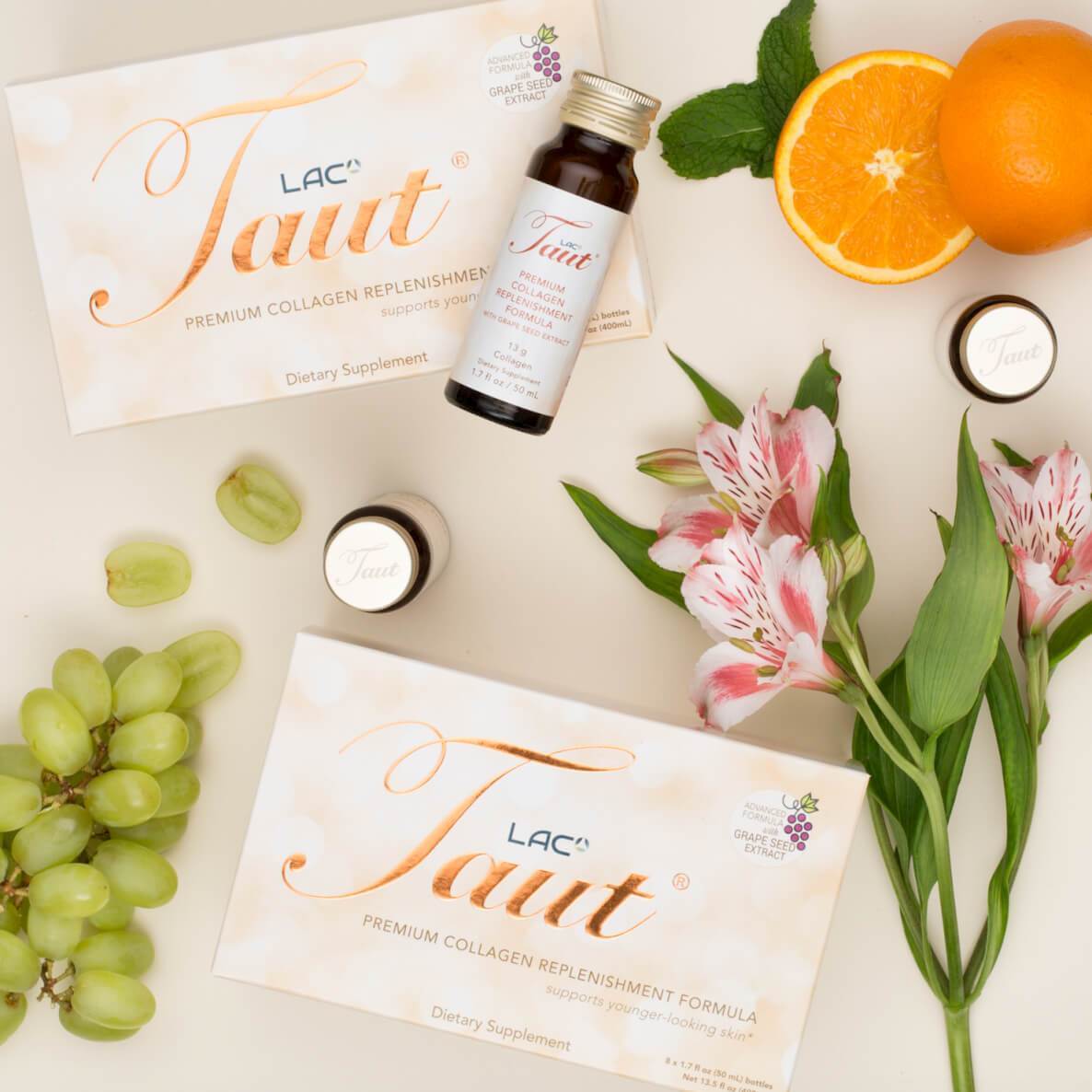
See what other customers have to say!
Bright and Firm
Unbelievable!! I just barely finished the first 3 boxes of Taut Collagen and 1 box of Bye-Bye Dark Spots. After 3 weeks my skin appears firmer and brighter, my dark spot is not totally gone but it has become lighter. I will reorder again and again to keep up my youthful look!
Truly incredible product, that works!
I’m on week three of Lac Taut, a liquid collagen drink (tasty) and I already see a difference in my hair and skin! My skin is clearer and more supple, my hair shinier and healthier looking. I am definitely going to continue with this supplement!
Wonderful
Amazing product. My skin is brighter and firmer and it’s only been 3 weeks and I’m taking half a dose of the brightening capsule. The collagen tastes delicious. My body is so sensitive to products and the fact that it had a positive response to Taut means that the ingredients are pure.
THANK YOU
Save up to 15% on your order when you select on of the skin care subscription boxes by RenewSkin Inc.!
References
- https://www.vogue.com/article/retinol-retinoids-guide-fine-lines-sun-damage-healthy-glow
- https://www.yahoo.com/lifestyle/difference-between-retinol-retinoids-didnt-161513014.html?guccounter=1&guce_referrer=aHR0cHM6Ly93d3cuZ29vZ2xlLmNvbS8&guce_referrer_sig=AQAAAB8W8AqklYr3LfD2sequQItqDWTrlomJoFdHKLcXIkfcXZuOcSRynhci7z-aNNFL_sJtPuuftC6AEnN8Sn7ns4GoUWF4HXYip3Wd8sAosVw9Ivac4iMrPC6I0hMAjVefnYLj8g5QjuLoDDmDHnKe-fAD8gBifPw4LpEIjaFiqXVU
- https://www.womenshealthmag.com/beauty/g34042800/best-retinol-cream/
- https://pubmed.ncbi.nlm.nih.gov/17515510/
- https://www.womenshealthmag.com/beauty/a19994493/retinol-to-prevent-wrinkles/
- https://jromano.com/hyperpigmentation-correction
- https://www.huffpost.com/entry/retinol-anti-aging-wrinkles_n_2002971



